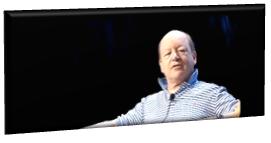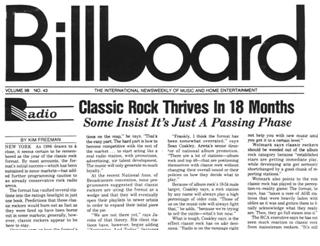As the holiday period winds down to a close, we’re showcasing some of our most-read blog posts from 2013. Today’s is a near and dear topic – the health of Classic Rock – which will no doubt be a popular one in the new year. Over the New Year’s weekend, Houston’s Arrow flipped to Urban, so that should get the “dead conspiracy” going. Here’s a little fodder for this format debate. And the fresh-baked content in JacoBLOG begins on Monday. Have a great weekend. – FJ
Way back in the mid-‘80s when I got Classic Rock going in markets from Los Angeles to Chicago to Detroit to D.C., the death knell for the format came quickly. For most Classic Rock startups at that time, the run-up was spectacular – and quick. But oftentimes, in just a few books, the ratings started to settle. In a few cases, it was worse than that.
And that’s when the rumors of Classic Rock’s impending demise took flight. I spent a lot of time defending the format, the genre, and the concept – often up against “AOR” consultants of that era who just couldn’t come to grips with the notion that large segments of their audience simply enjoyed rock from the ‘60s and ‘70s more than they did Ratt, Mister Mister, and White Lion. Similarly, many label people were in denial about the power of music that was a couple of decades old and why so many fans preferred it over their new releases.
Throughout the ensuing quarter century, Classic Rock has gained a great deal of respectability – and rightfully so. There are now more Classic Rock (and Classic Hits) radio stations than Mainstream/Active, Alternative, and Triple A outlets combined. And as recently as this past spring, the Arbitron numbers confirmed that Classic Rock ratings are not only stable – they’ve been growing.
This Billboard article back in 1986 summed up the format’s progress after just 18 months by noting that while Classic Rock was thriving, “some insist it’s just a passing phase.” There was a lot of that in the early years of the format.
And so Bob Lefsetz’s think piece the other day resonated for me. And it earned a fair amount of attention in radio circles, filling my Twitter account with queries about its efficacy, my response, and what’s really going on with the format. His great opening line – “Classic rock is dead” – was an attention getter, and kicked off a smart diatribe about how the world of music and the different generations that love it have changed. Bob’s writing is typically provocative, smart, and almost always forces you to emote – one way or the other. And for many people who read the piece (actually titled “Roar”), it makes you think.
However, Bob’s opening salvo has nothing to do with a radio format and everything to do with the ethos and emotion that the artists we now call “Classic Rockers” brought to the table decades ago. He points out that with few exceptions (and he notably singles out the incredibly talented Lorde’s single “Royals”), success in the music world today has been redefined. It’s now almost entirely about the song, while the character, politics, and fabric of the performer who creates it is as disposable and meaningless as most of the music itself.
That’s not new to those who have embraced Classic Rock – whether they are Baby Boomers, or this amazing – and growing – group of 25-34s who have apparently rejected everyone from 50 Cent to Lady Gaga to Mumford & Sons – and have “discovered” that the music their parents adored when songs actually reflected the world around us was pretty damn great.
While much of this has been blurred over the decades – clouded by video music discovery starting with MTV and exploding with YouTube – the fact that Classic Rock concerts continue to be commercially successful speaks to both the lasting power of the music and the ways in which the artists resonated with the times in which they rose to power.
Yet, most Classic Rockers have failed to score “new” hits of any kind in the ‘90s and beyond. And that shouldn’t surprise us. Sadly and predictably, those are the moments when concertgoers stream to the concession stands and the restrooms. While Lefsetz criticizes Paul McCartney’s new release, aptly titled “New,” it is actually a pretty good song (as Alan Cross notes, in a “Penny Lane” way”). And Lefsetz begrudgingly acknowledges that at the end of his post.
>EMAIL RECIPIENTS: CLICK HERE FOR PAUL MCCARTNEY’S SINGLE, “NEW”<
And let’s face it, like Brett Favre or Manny Ramirez, there comes a time when just about every superstar finally stops producing at a very high level. Whether that’s the Who, Garth Brooks, or Madonna, the performers you grew up with eventually settle into a comfortable place with their core audiences and ride out into the sunset. A well-planned career path with a great manager (think Irving Azoff) can have a very lucrative happy autumn for popular music stars. In Sir Paul’s case (along with performers like the Eagles or Springsteen), their live performances are still strong enough that audiences continue to pay mega-bucks to see them and go back to a happier place in time and in their lives for 90 minutes on a summer night.
So Classic Rock music – as well as the format – is anything but dead. But the system that brought us this music has been forever altered by the times and the promotional and marketing engine that is broken, no longer effectively exposing music from the labels through radio and to the masses.
It doesn’t have to be that way.
Radio could play a major role – albeit a different one that it used to play – in the curation and exposure of new music. But it is so busy playing it safe – playing defense – that it is has lost sight of its unique ability to provide perspective, context, and fun to music that is new and emerging. I’ve never understood the “prevent defense” in football. It is supposed to stop the opposition from scoring. But in fact, it almost always allows the other team to move the ball down the field. Once in the “red zone,” anything can happen. It is often a dumb strategy that backfires more than it works.
That’s essentially how radio has played the game against Internet pure-plays since streaming first became a new way to enjoy audio. Rather than continue to play a lead role and take advantage of its ubiquitous – and free – position in the musical ecosphere, radio hunkered down, played it close to the musical vest, and has become less and less relevant from a musical exposure point of view every year. The advent of PPM has only exacerbated the problem, convincing many radio stations and groups that newness is the catalyst for meter migration.
In reality, boredom is often the problem.
It doesn’t have to be that way.
Radio is the only medium that has the ability to take the consumer by the hand, localize and contextualize the music, and provide ways for new audiences to experience it that has nothing to do with bits and bytes.
When I first tried to get Classic Rock off the ground in the early ‘80s, I targeted “dog FM stations” – total losers in medium and larger markets that were well out of the top 20. This was before consolidation and cluster strategies. And in fact, my first taker was a Class A FM in Charlotte (Shar-LOT), Michigan, that was one of four AC stations in and around the Lansing market. Suffice it to say, it was a loser – just the kind of station that helped me grow my business with a hot “new” format throughout the rest of that decade.
But in today’s world, “dogs” look different. They are often that fourth station in the cluster – the one that ownership simply can’t get off the ground. And there’s at least one – if not more than one – in every market. Why would it be so odd or hare-brained for one station in most of the Top 50 markets (OK, we’ll give L.A. and New York a pass because nothing innovative ever starts in either place) to commit itself to playing nothing but new stuff – no oldies, no classics, no recurrents? Do most major and medium markets really need another Hot AC, a new Variety Hits station, or even (gulp!) another Classic Hits outlet?
 Think about a format that exposes Indie, Alternative, Country, and everything in between because the fact is that format walls are about as meaningful in today’s entertainment world as boom boxes. Millennials aren’t concerned about silos, format purity, and modality. They just want to hear great new music in a way they can personalize, share, and converse about. Radio could be at the center of that conversation because the time and effort it takes to navigate Spotify or YouTube can be used for other endeavors. Like finding employment.
Think about a format that exposes Indie, Alternative, Country, and everything in between because the fact is that format walls are about as meaningful in today’s entertainment world as boom boxes. Millennials aren’t concerned about silos, format purity, and modality. They just want to hear great new music in a way they can personalize, share, and converse about. Radio could be at the center of that conversation because the time and effort it takes to navigate Spotify or YouTube can be used for other endeavors. Like finding employment.
Like the McCartney song, you could even call it “New.” Because it truly would be.
So I realize I’ve taken the Lefsetz post on a hard left turn. But that’s OK. He does the same thing, and the fact is, it’s not Classic Rock that’s dead, but the spirit that made the music possible that’s on life support. Thanks, Bob, for kicking us all in the ass.
Radio could breathe some life into this tired business model.
It’s time to start throwing passes down the field.
- For Radio, Will It Be Christmas In April (And Hopefully, May)? - April 21, 2025
- Media And Technology In 2025: Believe It Or Not! - April 18, 2025
- In Radio, You Just Never Know - April 17, 2025





Leave a Reply